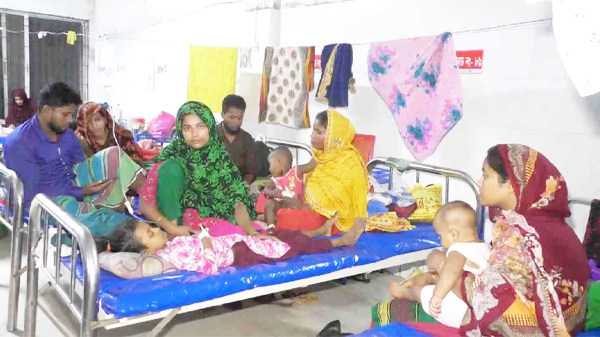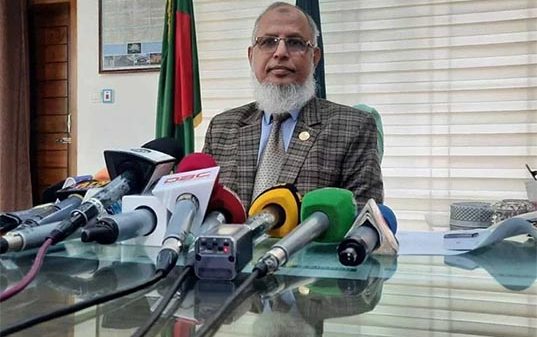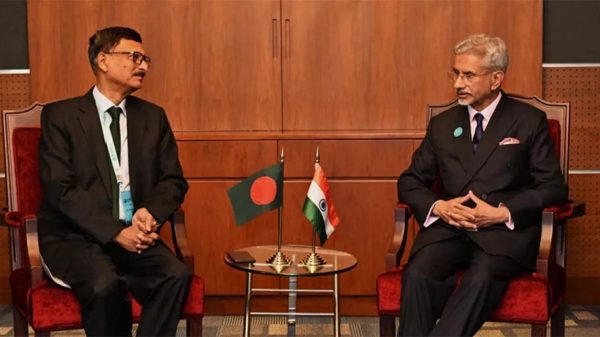At least 2-3 children die from pneumonia in Bangladesh every hour: icddr,b

- Update Time : Thursday, 9 November, 2023, 06:10 pm
- 119 Time View

Online Desk: Approximately 2-3 children die every hour from pneumonia in Bangladesh, according to icddr,b.
In Bangladesh, at least 24,000 children die every year, which is 24% of all deaths in under-five children—exceeding the global average, results from multiple studies show.
Globally, pneumonia remained the top infectious killer of children under five, with 0.7 million deaths annually—representing 14% of all such deaths.
The research papers were presented on Thursday at a discussion event, organised by icddr,b, titled “Childhood Pneumonia: Are We Doing Enough?” in the lead-up to World Pneumonia Day which is observed on November 12 every year.
Dr Mohammod Jobayer Chisti, a senior scientist at icddr,b, presented some of icddr,b’s research studies on pneumonia conducted by himself, Dr Nur Haque Alam, Dr K Zaman, and Dr Ahmed Ehsanur Rahman, that have been successfully trialled and piloted in Bangladesh and elsewhere.
The previous five years have seen stagnation at roughly 7.4 fatalities per thousand live births, coupled with an estimated 4 million new cases and roughly 677,000 hospitalisations annually, according to icddr,b.
This is in spite of significant reductions in mortality over the decades.
Dr Chisti highlighted that the causes of pneumonia in children in Bangladesh differ from the global scenario.
He emphasised the unique causes of pneumonia in hospitalised Bangladeshi children, with studies from 2019 and 2021 illustrating a high prevalence of antibiotic-resistant gram-negative bacteria.
These findings show that rare gram-negative bacteria are emerging as new causes of childhood pneumonia, he said.
Addressing preventative strategies, Dr Chisti pointed to icddr,b research confirming that improving air quality within homes could halve pneumonia mortality risks, while hand washing could reduce cases by around 21%.
“Vaccine studies conducted by icddr,b in 2007 and 2020 have identified vaccines suited to the local context, including the RSV vaccine for pregnant women, which is proving to be a valuable tool in preventing severe pneumonia and hypoxemia (low level of oxygen in the blood) in infants,” said Dr Mohammod Jobayer Chisti.
In terms of protective measures, exclusive breastfeeding practices have been shown to significantly decrease the risk of pneumonia, making infants 15 times less susceptible, yet the Bangladesh Demographic and Health Survey (BDHS) 2022 data indicates a decline in these practices in Bangladesh (65% to 55% in five years), according to icddr,b studies.
Childhood malnutrition, which amplifies the risk of pneumonia by 15 times, remains a critical issue, with wasting affecting 8% of children.
Prominent paediatric specialist Dr Md. Abid Hossain Mollah, BIRDEM General Hospital & Ibrahim Medical College, provided the foundational perspective, characterising pneumonia as an inflammation of the lungs primarily leading to coughing, which generally gets better within 2-4 weeks but can escalate to respiratory distress or even death.
At the discussion, speakers underscored that only 60% of parents seek medical care when their children display pneumonia symptoms, underscoring the need for increased public awareness.
The availability of pulse oximeters in health facilities, as shown in icddr,b’s studies, has significantly improved survival rates, given that a substantial proportion of paediatric pneumonia patients require supplemental oxygen.
The scientists also acknowledged icddr,b’s contribution to the government’s pilot of the Integrated Management of Childhood Illness (IMCI) initiative. icddr,b’s innovative Day-Care Approach (DCA) has demonstrated a 78%-92% success rate in treating severe pneumonia at half the cost, and plans to scale up this approach are ongoing.
Dr Chisti’s development of a low-cost bubble CPAP device at icddr,b has also been credited for its 75% reduction in mortality compared to standard WHO oxygen therapy, with successful implementation in 16 Ethiopian hospitals suggesting potential for broader application in Bangladesh.
Dr Tahmeed Ahmed, executive director at icddr,b delivered the welcome remarks.
“In the past diarrhoea was the leading cause of child deaths, but now pneumonia is the leading cause of child mortality. Pneumonia kills many children worldwide each year. Adults are also affected and are also at risk of death. There has been a lot of research on pneumonia in icddr,b which has been successfully trialled and piloted in other countries including Bangladesh. Our main goal is to make these results and methods more accessible to people.”










